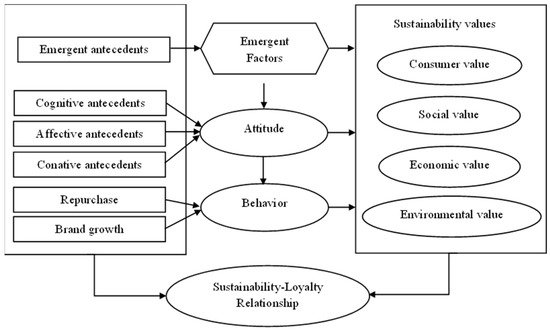Loyalty is one of the most important assets of a corporate brand. The growth of customer-centric marketing has occurred in the product-, market-, and customer-oriented phases.
- brand loyalty
- food retailing
- sustainability
- organic marketing
- values
1. Introduction

2. Identifying the Antecedents and Dimensions of Sustainable Food Marketing
Promoting consumer loyalty to retailers relies on dynamic long-term marketing inputs. To effectively achieve consumer-oriented brand loyalty, the identification of the antecedents and dimensions of sustainable food marketing is necessary.
2.1. Theoretical Contributions
(1) The dimensional research gap in relation to consumers’ cognitive concerns is represented by the lack of product/service life cycle in consumption practice. For example, in predicting loyalty, the behavioral measure fails to forecast the pre-purchase decision-making process, as a pure attitudinal measure may not capture actual purchases [132,133]. Furthermore, mixed measures at different construct levels may not reflect the direction of the actual causal relationships. Consequently, there is a lack of integrated dimensions to effectively predict brand loyalty.
(2) The measures of brand loyalty are suggested to be improving according to the industrial and marketing focus. The dimensions of satisfaction, brand value, and trust were measured in some studies as exogenous constructs, while these dimensions served as mediators in others. Product brand measures should not be used to predict service brands. Food retailers sell goods, while also providing services. Their sustainable branding activities evoke consumers’ cognition and increase their value. Therefore, consistent, transcending, and dynamic factors should be developed based on consumers’ perceptions.
(3) Regarding the data, sample, and research phase, qualitative and quantitative methods lend themselves to three research directions. Qualitative research aims to stimulate new theory development beyond the existing dimensions of the loyalty framework [134]. Quantitative research tests the reliability, validity, and significance of relationships among the antecedents of loyalty. Finally, field and consumption practice research can more directly observe consumers’ actual behaviors in association with their loyalty across the product/service cycle.
(4) Further research on retailer brand loyalty can be extended to study the relationship among service-dominant loyalty, environmental consequences, and social well-being. In this case, a mixed qualitative-quantitative approach may be appropriate to find the emergent factors in relation to sustainability and identify the complex correlations, thus producing enlightening results.
(5) The conceptualization of consumer loyalty for retailers may integrate constructs involving emergent factors and elements of sustainability value, sustainable marketing elements, and loyalty. Organic marketing, innovativeness of store formats, and improvement of healthy and nutritional food products and services stimulate organic and retailer brand growth [135,136]. The value created by this growth can contribute to loyalty construction in coordination with economic, environmental, consumer, and social values. Previous research studies concur that consumer attitude toward sustainability is related to consumer loyalty if brands make strategic decisions that have positive impacts on the environment [137,138].
2.2. Managerial Implications
As loyalty is often regarded as a multi-dimensional construct, consumers can switch quickly to competitors and content can be changed dramatically because of the dynamic social and environmental influences. It is suggested that retail corporate managers should identify both loyal consumers in terms of their purchase behavior and unexplored consumer groups that attitudinally and cognitively lean toward retailers’ sustainable marketing development. They can also strengthen loyalty by emphasizing positive organic business growth and organic knowledge diffusion and by further guiding the specialized organic marketing efforts toward sustainability. Using a simpler but strategic value measure may sustain loyalty in the long term.
This entry is adapted from the peer-reviewed paper 10.3390/su132313419
